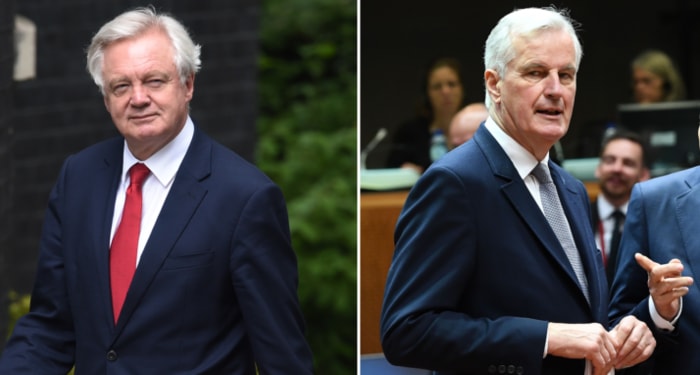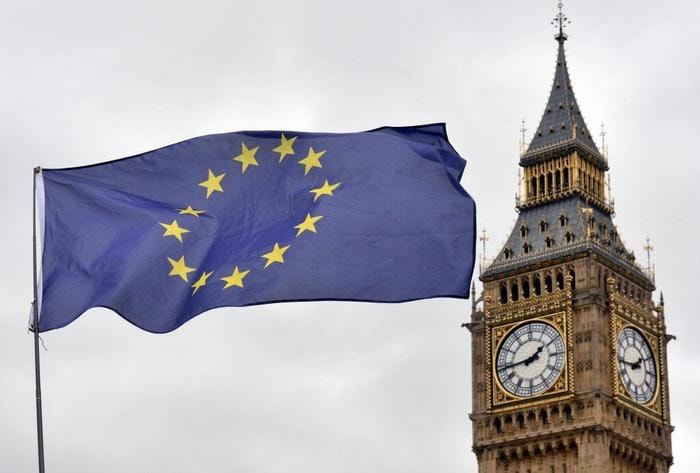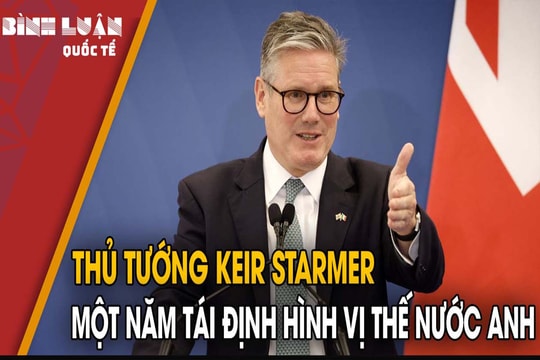UK - EU: Efforts to avoid 'painful divorce'
(Baonghean) - Despite the unfavorable results of the parliamentary election for the Conservative Party, despite internal troubles after the fire at a high-rise apartment building in London, British Prime Minister Theresa May still decided to start negotiations with the European Union on taking Britain out of the bloc (Brexit) yesterday as originally planned.
Although both the UK and the EU are trying to avoid a “painful divorce” for both, no one is sure what scenario will happen at the end of this difficult journey of nearly 2 years.
 |
| Mr. David Davis (left) and Michel Barnier will face off uncompromisingly at the negotiating table. (Getty) |
The relentless tug of war
The UK delegation is led by Brexit Secretary David Davis, while the EU delegation is headed by Michel Barnier, former French Foreign Minister. David Davis and Michel Barnier will have to discuss a series of issues in one of the most complex negotiations in the history of the formation and development of the European Union, such as the legal status of British citizens in the EU and vice versa, the UK's access to the European common market, the free movement agreement, etc. As expected, the agreement will determine the date of the UK's official departure from the EU as 00:00 on March 30, 2019, that is, 2 years after the date British Prime Minister Theresa May sent a letter notifying the EU of the activation of Brexit (unless the two sides agree to extend the negotiation process). Before the negotiation, Michel Barnier said that the agreement between the two sides - if any - would have to be reached around October 2018, after which each side would have four to five months to ratify it before the UK officially leaves the EU.
Both David Davis and Michel Barnier have a huge responsibility to ensure the best interests of their respective sides. In a statement, Davis said he wanted to reach an “unprecedented” agreement that would help both sides develop strongly and prosper, honor the common values of the EU, and express his determination to protect the safety of British citizens.
Meanwhile, Mr. Michel Barnier mentioned a “friendly and solid” agreement and did not emphasize the “hard” or “soft” Brexit scenario. But behind the well-intentioned statements to the press, everyone understood that both the UK and the EU would not compromise at the negotiating table to achieve pre-determined priorities. The UK wants to maintain access to the European single market, reach a new customs agreement and limit immigration from the EU. In contrast, the EU wants to focus on protecting the rights of the three million EU citizens currently in the UK, recover the amount of money that the UK must fulfill according to its committed financial obligations of about 65 billion USD and limit the economic impacts that could cause a “domino effect” affecting all 27 remaining member states.
 |
| It will be very difficult to shape UK-EU relations after 30/3/2019. (Press Association) |
“Hard” or “soft”? - 50/50
Previously, British Prime Minister Theresa May had planned a “hard” Brexit, meaning that the UK would leave the EU without a deal, with the view that “no deal is better than a bad deal”. However, the defeat of Mrs. May’s Conservative Party in the recent general election has made things develop in a different direction. With a weaker position after the election, Mrs. May is under great pressure to adjust the Brexit plan in a softer direction. In order to form a government, the Conservative Party is negotiating a coalition with the Democratic Unionist Party (DUP) – the party that still wants the UK to maintain a free trade agreement with the EU as well as regulations to facilitate the movement of people, goods and services.
Furthermore, statistics show that the UK economy is showing signs of poor growth, with a forecast of 1.6% for 2017 and 1% for 2018. Consumer spending in the UK in May 2017 also fell by 0.8% compared to the same period in 2016, the first time this figure has fallen since September 2013. These figures put Theresa May in a position to listen to opinions from businesses that British negotiators need to put the economy and the interests of the people at the center of the negotiations. Meanwhile, no deal or a bad deal will be detrimental to a series of areas such as jobs, investment and growth. On the last night before Mr. David Davis entered the negotiating table, British Finance Minister Philip Hammond once again reiterated that the British Government hopes that the UK and the EU can reach a mutually beneficial agreement.
The developments within the UK have also made Europe place greater hope on a “soft” Brexit scenario to keep the UK in the bloc’s single market. However, German Foreign Minister Sigmar Gabriel also warned that London cannot choose its own conditions. Accordingly, to stay in the European single market, the UK must accept the free movement of workers from EU countries. The EU’s position is very clear: “Keep the British as close to the EU as possible, but not at the cost of dividing the remaining 27 countries.”
There is no denying that the negotiations ahead will be extremely difficult for both the UK and the EU, and the odds of a hard Brexit and a soft Brexit are still evenly split. However, optimists say that the core member states of the European Union – including the UK in the past – have long been known as great negotiators who have been able to “live together” with each other for decades. Therefore, this is the time for them to use their famous negotiating skills, accept certain concessions to reach a final agreement, so that the “divorce” between the UK and the EU can take place in an orderly manner and without causing too much pain to either side.
Thuy Ngoc




